Abidjan Convention Parties Increase Budget By 39 Per Cent, Vowing To Keep Body Alive
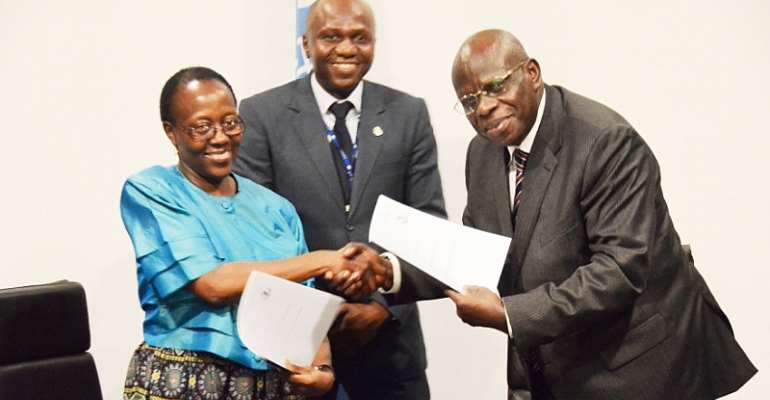
ABIDJAN 2 April 2014 - Parties to the Abidjan Convention covering West, Central and Southern Africa have agreed to a 39 per cent increase in their biennial budget on the 2013 scale.
'This is very positive and the sign that the Convention is really back to life with strong support of the Contracting Parties,' Abou Bamba, Coordinator of the Abidjan Convention, said at the end of the five-day conference which was another landmark in the revitalization of the Convention Secretariat's activities.
The budget increase was one of 15 approved decisions of the 11th Conference of Contracting Parties to the Convention for Cooperation in the Protection, Management and Development of the Marine and Coastal Environment of the Atlantic Coast of the West, Central and Southern Africa Region.
Other important decisions approved were:
for Nigeria host the Emergency Coordination Centre to fight against Marine Pollution
the revitalization of the 1984 Action Plan for the Protection and Development of the Marine Environment and Coastal Areas of the West and Central Africa Region
the establishment of an ad hoc Committee on Communication, Education and Public Awareness to foster recognition of the importance of protecting and developing the marine environment and coastal areas of the Convention area
for the working group of the Group of Experts for Ocean Governance in Africa to continue providing guidance for alignment of existing relevant mechanisms; and to develop, with partners, a comprehensive ocean governance capacity-building programme
the approval of regulations governing attribution of the status of International Partner Organization of the Abidjan Convention; and confirmed this status to BirdLife International, World Wildlife Fund, International Union for the Conservation of Nature (IUCN) and Wetlands International
for the Secretariat to collaborate with Parties to the Convention and other bodies to organize capacity-building workshops, particularly the small island developing states, for the identification of marine areas of Ecological or Biological Significance Areas
the instruction to the Abidjan Convention Secretariat to set up a working group to study all aspects of conservation and sustainable use of the marine biodiversity of the areas located beyond national jurisdictions within the framework of the Abidjan Convention
to the promotion of South-South cooperation to support capacity-building and technological exchanging expertise, experiences, good practices and knowledge among experts and institutions of the South, as envisaged in the New Partnership for Africa's Development (NEPAD). In this respect, the Conference asked UNEP to support the South-South cooperation process within the framework of existing initiatives and by 'all other financial and technical means at its disposal', in particular with regard to the Abidjan Convention
An example of the decision on South-South cooperation was well illustrated by the presence at the COP of the Uruguay Ambassador to South Africa Daniel Castillos Gomez, as guest of honour. Ambassador Castillos Gomez represented Uruguay Foreign Minister Alberto Guani Amarilla, who is also temporary president of the Zone of Peace and Cooperation of the South Atlantic, which is shared by African and South American countries.
The next Conference of the Parties will be held toward the end of 2016 in Banjul, Gambia.
Ad Hoc Committee on Science and Technology
Outside of the Conference two significant decisions were taken. On 16 March, the Ad Hoc Committee on Science and Technology for the Convention held its first meeting since its creation in 2012. South Africa was elected Chair and the Republic of Congo, Vice Chair. The Committee is to provide scientific, technical and technological advice to Parties, relating to the implementation of the Convention.
At the meeting, the new Chair, Alan Boyd of South Africa, said that some of the Committee's objectives were to further the interests of the Abidjan Convention by sourcing and providing information to advance the blue economy, the theme of COP 11. Moreover, the Committee will enable Africa to increase biodiversity protection on the basis of collection of scientific knowledge about the state of their marine and coastal environments. Under this committee the Abidjan Convention Secretariat, in partnership with the three large marine ecosystem projects and commission within the Convention area and others, are 'to develop a communication plan on the economic value of ecological infrastructure'. They will also assess the economic capacity of the services and goods able to drive the sustainable exploitation of the marine ecosystems of the Contracting Parties, the regions and the most vulnerable.
.
In a related development, South Africa's Department of Environmental Affairs, which owns the marine research vessel, the SA Algulhas II, offered its use free of charge to Parties of the Convention. In a comment, UNEP Executive Director Achim Steiner welcomed this offer from South Africa, describing it as 'an excellent example of South-South Cooperation which shall immediately be implemented'.
Up till now, some countries have had to rely on the Fridtjof Nansen, a research vessel the Government of Norway has provided. Research vessels of his nature can play a significant role in pushing forward the blue economy model on which presentations were made under the COP conference theme of 'Promoting Blue Growth in Africa: toward sustainable management of marine resources'.
Blue Economy
The blue economic principle is the marine equivalent of the green economy. Its application in the Abidjan Convention region would lead to significant earnings of several Parties, more jobs and a far greater likelihood of keeping marine and coastal environments free of pollution and the depletion of resources.
'The combined oceans and coasts jurisdiction of our countries is huge, and represents a development node or area that is potentially very significant to all our people and economies. It is therefore very relevant that this COP is dedicated to exploring further the idea of the Blue Economy,' Edna Molewa, South Africa's water and environmental affairs minister, told delegates 20 March at the start of the ministerial segment of the conference.
In her speech, the UNEP Officer in Charge of the Division of Environmental Policy Implementation, Elizabeth Mrema, said that the economic valuation of the coastal and marine resources in the region would be crucial to the Parties in capitalizing on the marine and coastal assets. Her examples of these were sustainable tourism and the setting of environmental standards for offshore oil and gas exploration and exploitation 'At the same time, the benefits from these assets of the seas and coast can only be shared under a regime of common ocean governance,' she added.
The conference attracted 243 participants, five of whom were ministers from the 16 parties to the Abidjan Convention. There was also a strong show of partners to the Convention, such as the International Union for the Conservation of Nature, Wetlands International, Birdlife International, the International Ocean Institute-South Africa, U.S. Africa Command (Environmental Security Programme), the International Institute for Sustainable Development and International Relations, GRID-Arendal, International Maritime Organization, the Global Initiative for West, Central and Southern Africa, Wetlands International, Birdlife International, the United Nations Division for Ocean Affairs and the Law of the Sea (DOALOS); and new partners RAMPAO and COREP that, respectively, specializes in marine protected areas and Sustainable fishery practices.
Memoranda Signed
Immediately at the close of the conference, the Abidjan Convention Secretariat finalized memoranda of understanding with two subregional bodies: the Regional Network of Marine Protected Areas in West Africa (RANMPAO); and the Regional Fisheries Committee for the Gulf of Guinea (COREP).
RAMPAO's ultimate goal is 'to ensure, at the scale of the West African marine eco-region..., the preservation of a coherent set of critical habitats needed for the dynamic functioning of ecological processes necessary for the regeneration of natural resources and the conservation of biodiversity for the benefit of society'.
COREP's mission is to assist Member States of the Economic Community of Central African States in ensuring sustainable fishing and its protection, and as well as promoting development of aquaculture for the well-being of the greatest number of people.
DEPI Director Elizabeth Mrewma signed on behalf of the Abidjan Convention Secretariat, while COREP Executive Secretary Emile Essema signed for his organization and Aboubacar Oulare, president of RAMPAO, signed for his. ' The formalization of our ties with these organizations will enable the Abidjan Convention Secretariat to assist countries in West and Central Africa in the field of marine protected areas and sustainable fisheries management as well as sustainable coastal-based tourism,' Abou Bamba, the Abidjan Convention coordinator, said.
The Convention for the Cooperation in the Protection, Management and Development of the Marine and Coastal Environment of the Atlantic Coast of West and Central and Southern African Region (Abidjan Convention) is one of the African regional Seas conventions administered by UNEP.
The Abidjan Convention and its protocol concerning cooperation in combating pollution in cases of emergency - came into force in 1984. The area covers the 22 coastal states on the Africa side of the Atlantic Ocean from Mauritania to South Africa.
It is a comprehensive umbrella agreement for the protection and management of the marine and coastal area, and aims to address pollution from ships, dumping, land-based sources, exploration and exploitation of the sea-bed, and pollution from or through the atmosphere. It also makes provision for liability and compensation in case of pollution.
For more information contact: Mr. Abou Bamba, Regional Coordinator, Abidjan Convention/UNEP - Tel: +225 027 18781 - Email: [email protected]
All Photo Credits: South African Department Of Environmental Affairs
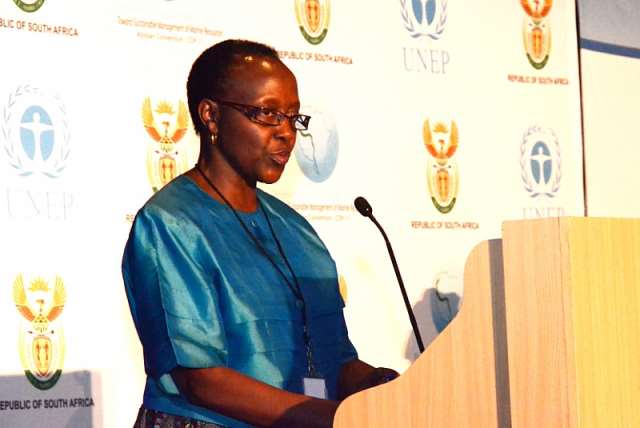
2014-04-03 145310
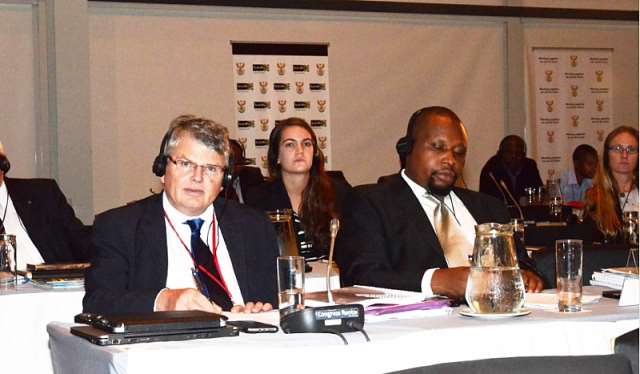
2014-04-03 145520
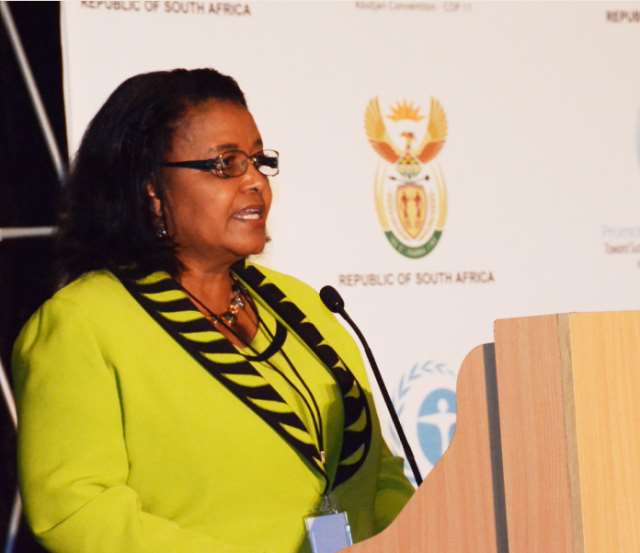
2014-04-03 145833
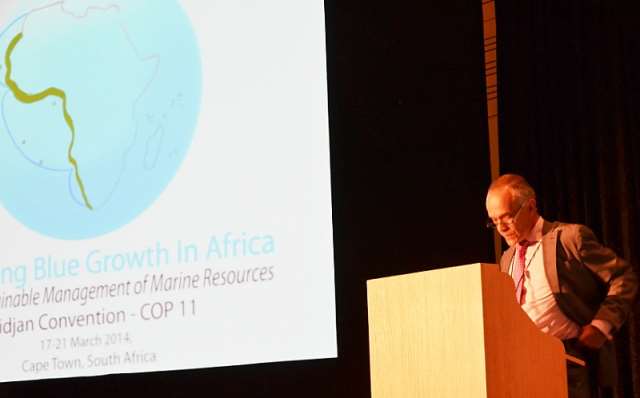
2014-04-03 150014
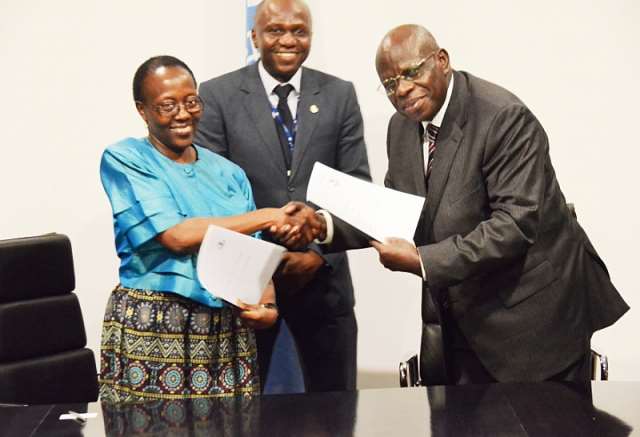
2014-04-03 150107
